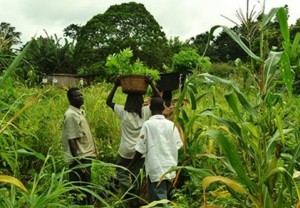Social Investment Fund to support farmers with $3.1m micro-credit
 The Social Investment Fund (SIF) under the Integrated Rural Development Project (IRDP) is supporting farmers in 21 selected districts across the nation with micro-credit of US$3.12 million to increase output.
The Social Investment Fund (SIF) under the Integrated Rural Development Project (IRDP) is supporting farmers in 21 selected districts across the nation with micro-credit of US$3.12 million to increase output.
The goal is to help raise household incomes and provide employment through enhanced farming, marketing and distribution in the agricultural production value chain.
The Arab Bank for Economic Development in Africa (BADEA) and the OPEC Fund for International Development (OFID) are providing the funding for the project.
Beneficiaries would include micro, small and medium-scale farmers and farmer groups engaged in the cultivation of maize, guinea corn, millet, sorghum, groundnuts, pepper, livestock and fisheries.
A facts sheet made available to the Ghana News Agency (GNA) in Kumasi by the SIF, said women involved in the marketing, agro-processing, fishing and distribution of food crops are also targeted to benefit from the four-year project.
It gave the average loan size as US$1,000, which could be increased with the evolution of the loan demand pattern.
The money is to be used either as working capital – land clearing, farm maintenance, post-harvest storage, warehousing facilities, purchase of food stuff and agricultural products or for procurement of equipment – agro-chemicals, improved seeds, spraying guns and carts.
It said relevant decentralized departments of the beneficiary Metropolitan, Municipal and District Assemblies (MMDAs) were being strengthened to provide the requisite institutional support to the project, and specifically mentioned the Food and Agriculture Ministry, Department of Community Development, the Department of Cooperatives and the District Planning and Coordinating Unit.
Alongside the micro-credit, the IRDP has a component that involves construction of classroom blocks, mechanized boreholes, teachers’ and nurses’ accommodation, rural clinics and community health planning and services (CHPS) compound, maternity homes, drainage systems, culverts and markets for people in the beneficiary communities.
Source: GNA
